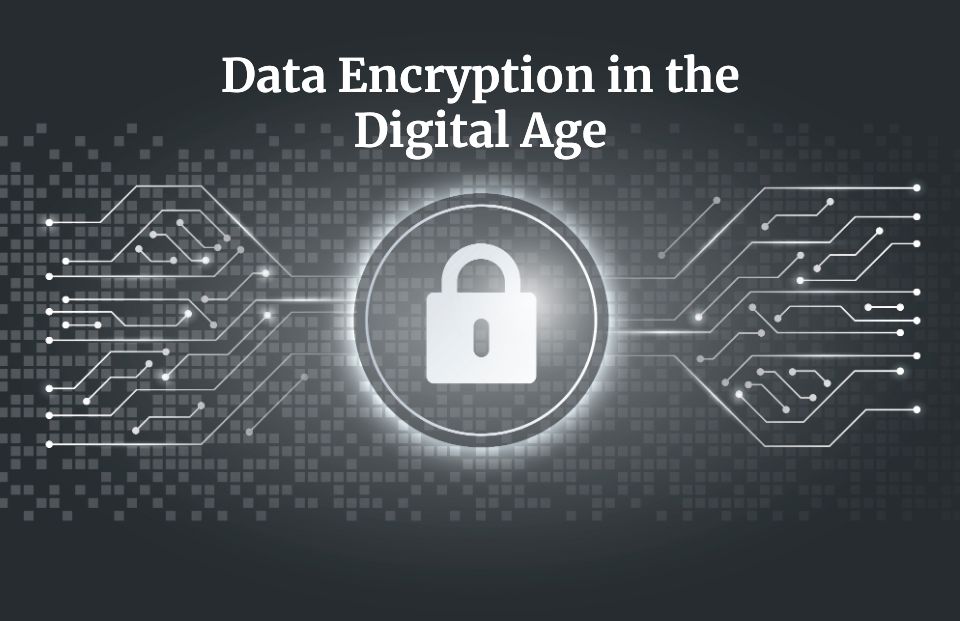In today’s digital age, sensitive information is generated and stored in vast quantities, and this information is often the target of cyber criminals and hackers. Protect this sensitive information, encryption is an essential tool that helps to secure it and prevent unauthorized access.
What is Encryption? It is the process of converting plain text into an unreadable format using an encryption algorithm and a secret key. When the encrypted data is received, it can only be decrypted and read using the same key. This ensures that sensitive information is protected, even if it is intercepted or stolen.
The importance of data encryption cannot be overstated in today’s digital world. From protecting sensitive information to enhancing data privacy and security, encryption is a critical component of cybersecurity. This blog will explore the importance of data encryption in detail, highlighting its many benefits and the reasons why organizations and individuals must prioritize it as a critical component of their data security strategy.
Whether you are an individual or an organization, the need for data encryption is clear. By understanding the importance of data encryption and its role in protecting sensitive information, you can make informed decisions about how to secure your sensitive information and keep it safe in the digital age.
Benefits of Data Encryption in this Era
Data encryption provides numerous benefits in today’s digital era, including enhanced data privacy, improved security in cloud computing, increased confidence in digital transactions, protection of data in transit and at rest, and protection against insider threats and data ransomware attacks. Encryption also supports business continuity and facilitates cross-border data sharing.
By implementing data encryption, organizations and individuals can ensure that sensitive information remains secure and protected from cyber threats, supporting overall data security and privacy and having too much importance of encryption.
Protecting Sensitive Information
Encryption is crucial in protecting sensitive information from unauthorized access. This information can include personal identity information, financial information, and confidential business information. Without encryption, this information is vulnerable to cyber threats such as hacking, data breaches, and theft. In the event of a data breach, encryption can prevent hackers from accessing sensitive information and using it for malicious purposes.
Compliance with Regulations
Many industries are subject to regulations that require the protection of sensitive data. For example, the healthcare industry must comply with the Health Insurance Portability and Accountability Act (HIPAA) and the financial industry must comply with the Payment Card Industry Data Security Standard (PCI DSS). These regulations require encryption of sensitive data to ensure that it is protected and not accessible to unauthorized parties. Encryption helps organizations to meet these regulatory requirements and avoid costly fines and penalties for non-compliance.
Enhanced Data Privacy
Encryption helps to enhance data privacy by ensuring that sensitive information is only accessible to authorized parties. This means that only individuals who have the encryption key can access the information. This is especially important in the digital age, where data privacy has become a major concern due to the increasing number of data breaches and cyber attacks. Encryption helps to ensure that individuals and organizations can trust that their sensitive information is protected.
Improved Security in Cloud Computing
Cloud computing has become an increasingly popular way of storing and accessing data, but it also presents security challenges. Encryption helps to improve security in cloud computing by ensuring that sensitive information is protected both in transit and at rest. When sensitive information is transmitted over the internet, it is encrypted to prevent unauthorized access. When it is stored in the cloud, it is also encrypted to prevent unauthorized access in the event of a data breach.
Increased Confidence in Digital Transactions
Encryption helps to increase confidence in digital transactions by ensuring that sensitive information is protected during the transaction process. This includes financial transactions such as online purchases, as well as other types of digital transactions such as online banking. Encryption helps to ensure that sensitive information is protected from unauthorized access during the transaction process, which helps to increase confidence in digital transactions.
Protecting Data in Transit
Encryption is also important in protecting data in transit. Data in transit refers to information that is being transmitted over a network, such as an internet. Without encryption, this information is vulnerable to cyber threats such as man-in-the-middle attacks, where an attacker intercepts the information in transit and can access it. Encryption helps to protect data in transit by encoding the information and ensuring that it can only be accessed by authorized parties.
Protecting Data at Rest
Encryption is also important in protecting data at rest. Data at rest refers to information that is stored on a device or in a cloud storage environment. Without encryption, this information is vulnerable to cyber threats such as hacking and theft. Encryption helps to protect data at rest by encoding the information and ensuring that it can only be accessed by authorized parties.
Protects against Insider Threats: Encryption helps to protect against insider threats, where an unauthorized individual within an organization accesses sensitive information. Encryption ensures that even if an insider gains access to sensitive information, they will not be able to read it without the encryption key.
Prevents Data Ransomware Attacks: Encryption can help to prevent data ransomware attacks, where an attacker encrypts sensitive information and demands a ransom payment in exchange for the decryption key. With encryption in place, the attacker would not be able to access the sensitive information even if they successfully encrypted it.
Enhances Security for Mobile Devices: Encryption is particularly important for mobile devices, which are often used to store and access sensitive information. Encryption helps to protect sensitive information on mobile devices, even if the device is lost or stolen.
Provides Peace of Mind: Encryption provides peace of mind for individuals and organizations by ensuring that their sensitive information is protected and secure. This can help to reduce the risk of identity theft, financial fraud, and other cyber threats.
Supports Business Continuity: Encryption helps to support business continuity by ensuring that sensitive information is protected and accessible even in the event of a disaster or cyber attack. This helps to minimize the risk of data loss and ensure that businesses can continue to operate even in the face of adverse events.
Facilitates Cross-Border Data Sharing: Encryption can facilitate cross-border data sharing by providing a secure and reliable means of transmitting sensitive information across national borders. This can help to support international business and improve collaboration between organizations.
Supports Digital Transformation: Encryption supports digital transformation by enabling organizations to adopt new digital technologies and services with confidence. Encryption helps to ensure that sensitive information is protected and secure, even as organizations embrace digital transformation and move more of their operations to the digital world.
The importance of data encryption in the digital age cannot be overstated. With the increasing amount of sensitive information that is generated and stored in the digital world, it is essential to protect this information from unauthorized access. Encryption helps to protect sensitive information, comply with regulations, enhance data privacy, improve security in cloud computing, increase confidence in digital transactions, protect data in transit, and protect data at rest. Organizations and individuals must make encryption a top priority to ensure that their sensitive information is protected and secure in the digital age.
It is important to note that encryption is not a one-time solution, but an ongoing process that must be constantly monitored and updated to ensure that it remains effective against emerging cyber threats. This means that organizations must regularly assess their encryption methods and implement new and updated encryption technologies as they become available.
Conclusion
Data encryption is a critical component of cybersecurity in the digital age. Organizations and individuals must prioritize encryption and make it an ongoing part of their data security strategy to ensure that their sensitive information is protected and secure. By doing so, they can have peace of mind knowing that their sensitive information is protected from unauthorized access and cyber threats.
FAQ’s
In this blog, we delve into the importance of data encryption in the digital age and how it helps to protect sensitive information from cyber threats. To further explore this topic, we have compiled a list of 5 frequently asked questions about data encryption, including what it is, why it’s important, its benefits, how it works, and how it can be implemented. Whether you are an individual or an organization, understanding the importance of data encryption is crucial for securing sensitive information and staying ahead of emerging cyber threats.
1. What is Data Encryption?
Data encryption is the process of converting plain text into an unreadable format using an encryption algorithm and a secret key. The encrypted data can only be decrypted and read using the same key, ensuring that sensitive information is protected from unauthorized access.
2. Why is Data Encryption Important?
Data encryption is important because it helps to protect sensitive information from unauthorized access and cyber threats. It enhances data privacy, improves security in cloud computing, increases confidence in digital transactions, protects data in transit, and protects data at rest. Encryption is also critical for complying with data protection regulations and reducing the risk of financial fraud and identity theft.
3. What are the Benefits of Data Encryption?
The benefits of data encryption include enhanced data privacy, improved security in cloud computing, increased confidence in digital transactions, protection of data in transit, protection of data at rest, and protection against insider threats and data ransomware attacks. Encryption also supports business continuity and facilitates cross-border data sharing.
4. How Does Data Encryption Work?
Data encryption works by converting plain text into an unreadable format using an encryption algorithm and a secret key. The encrypted data can only be decrypted and read using the same key, ensuring that sensitive information is protected from unauthorized access. Encryption algorithms and keys must be regularly updated to ensure that they remain effective against emerging cyber threats.
5. How Can I Implement Data Encryption?
Implementing data encryption is an ongoing process that must be part of an organization’s overall data security strategy. It involves regularly assessing and updating encryption methods, implementing new and updated encryption technologies, and training employees on best practices for data encryption and security. Organizations can also consider using encryption tools and services offered by third-party vendors to support their encryption efforts.

